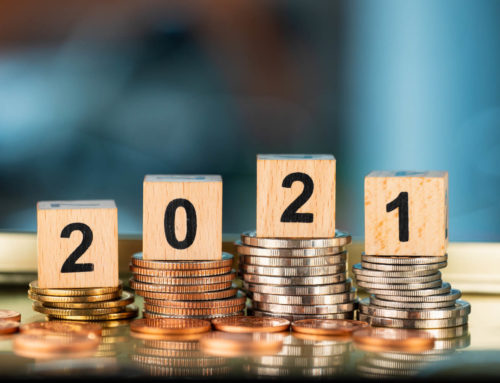What would you do with more money in your bank account? Maybe you’re working your way up to a new house, or a dream vacation, or want more peace of mind. But as often as you’ve tried to save money, your money habits have hit roadblocks and derailed your progress.
Many online financial advice spaces create unrealistic expectations. Financial gurus sometimes give out arbitrary numbers associated with financial goals. They can come across with a “my way or the highway” attitude. Not to mention the hot topics, such as side hustles, passive income, investing, cryptocurrency, and early retirement, that make you question if you’re doing enough.
The point of this article is not to give you a trite, repetitive, or soulless set of goals to overwhelm you. Instead, this article is to help you consider ways you can save money, build wealth, and develop your financial security.
Create and Stick to a Budget

It is often repeated, but creating and sticking to a budget remains the best way to start saving money effectively and, here’s why.
First, creating a budget helps you get a clear picture of where you are with your money. Second, it helps you anticipate your spending for the next week, month, or year and measure how accurate your spending ideas are. Third, a budget is–and should be– adjustable to your situation.
You should not copy a budget template and follow it exactly as written. Your life is different from the person who made that template, and as such, you can and should make it work for you.
With enough commitment, you’ll get into the habit of budgeting regularly.
From there, you can see where your wins and losses are and adjust accordingly.
How to Budget and Save Money

You should establish a baseline for your finances. Start by noting your anticipated monthly income and expenses.
Categorizing expenses into insurance, housing, credit card payments, groceries, utilities, and so on will help keep you accountable financially.
Don’t overthink your budget, especially in the beginning. For the first few months, keep a budget spreadsheet or journal to understand your spending habits.
If you spend more or less in a particular category within your budget, it’s okay to increase or lower dollar amounts allocated to that category. A budget should always be a process of refinement.
To get serious about saving money, make sure your budget reflects a specific amount to save during the month. Pay yourself first.
Ask Yourself: “What Do I Value Enough to Spend Money On?”

Saving money is important, but don’t create a budget so restrictive that you can’t enjoy what you save. Some budgeting and saving advice quickly default to cutting back spending. However, you shouldn’t cut back on things you value to the point that saving money is painful.
For example, you may think a quick path to saving more dollars is to spend less on food. But if you fail to stock tasty and nutritious staples, you may opt to eat out and end up spending more. Plus, poor food choices can negatively impact your health, resulting in later medical bills.
If you can stop spending money on things that don’t bring you value, you may find more money available to spend on things that matter most to you.
What Can I Eliminate to Increase My Net Income?
Focusing on eliminating debt is an easy way to increase the amount of money that remains in your wallet at the end of the month. As we’ve discussed before, using the debt snowball strategy is a viable way to eliminate small debts and increase the amount of dollars that can go toward more significant obligations.
To determine if this is the right financial strategy for you, calculate how much you spend on monthly debt payments. You may be surprised at how much more money you’ll have once those debts are paid off.
In the age of subscription boxes and entertainment, it is worth reviewing how much you are spending. Is there a subscription video service you only watched during one show’s season that you could cancel? Do you really need a monthly fix of makeup, skincare or clothing?
What Am I Doing to Meet My Financial Goals?
You should regularly review how well you kept to your budget—at least monthly. You can learn and adapt when you check your budget from the previous month and see how well you did with your goals.
Every month during your budgetary review, you should honestly assess what you did to meet your goals and how you can improve.
If you have much to improve, don’t beat yourself up; acknowledge what it is, and then set goals and plans to improve.
What Can I Do to Improve My Financial Habits?
Use this question to guide you as you change your budgetary goals.
As you review your budget, look for areas in which you struggle the most and carefully consider what challenges you encountered the month before. Examine the issues from every angle, and then create a plan to prepare and mitigate those challenges to ensure you reach your financial goals.
What Products Does My Bank Offer that I Could Be Using?
As you increase the amount of money you can save, you can protect and help maximize your savings with services available from your local bank. A regular savings account is a great option if you need regular access without worrying about when you can contribute or withdraw funds.
If you want to earn more interest on your dollars, premium savings accounts, including money market and certificate accounts, are also available and help your account grow.
If you decide to bank with F&M Bank, some plans to consider include:
- Smart Savings
- Choice Interest Checking
- Choice Money Market
Each of these accounts is interest-bearing, accessible, and convenient with free online and mobile banking options. Visit F&M Bank’s Personal Deposit Solutions page to learn more.
Creative Ways to Save Money 2023
For non-traditional ways to save money this year, use this list of ideas to navigate your personal savings journey.
- Share internet streaming service accounts with friends and family
- Carpool to save money on gas
- Take time to prepare meals for the week
- Monitor deals at different stores for the best bargains
- Think through impulse buying
- Set aside “fun money” or “blow money” if you enjoy making impulse buys
- Get your weekly groceries through virtual shoppers or store pickup services
- Spend most of your time grocery shopping on the perimeter of the store to avoid expensive processed foods
- Use incognito browsers when shopping for hotels, airline tickets, and concerts
- Use deal-finding plugins, websites, or apps to find the best deals for what you’re searching for
How Can Millennials Save Money?
Millennials can save money the same way as other generations.
- Eliminate or reduce debts
- Stay consistent with credit card payments and avoid compounding interest
- Make a budget
Millenials are often stereotyped as buying things they can’t afford, like Starbucks coffees and avocado toast. However, the millenial generation is actually quite savvy when it comes to money and have found ways to make extra cash online through apps like DoorDash, selling homemade products on Etsy, or monetizing content on YouTube.
How to Save Money Fast
The fastest way to start saving money is to eliminate debt and channel that money into your savings account to earn interest and grow. The other way to quickly start saving money is to plan to put away large amounts of your paycheck for a few months and be as frugal as possible with your other necessary expenses. Once you’ve built up your savings, it’s okay to reduce the dollar amount of your contributions. But, you should still pay yourself first and plan to save a set dollar amount each month.





